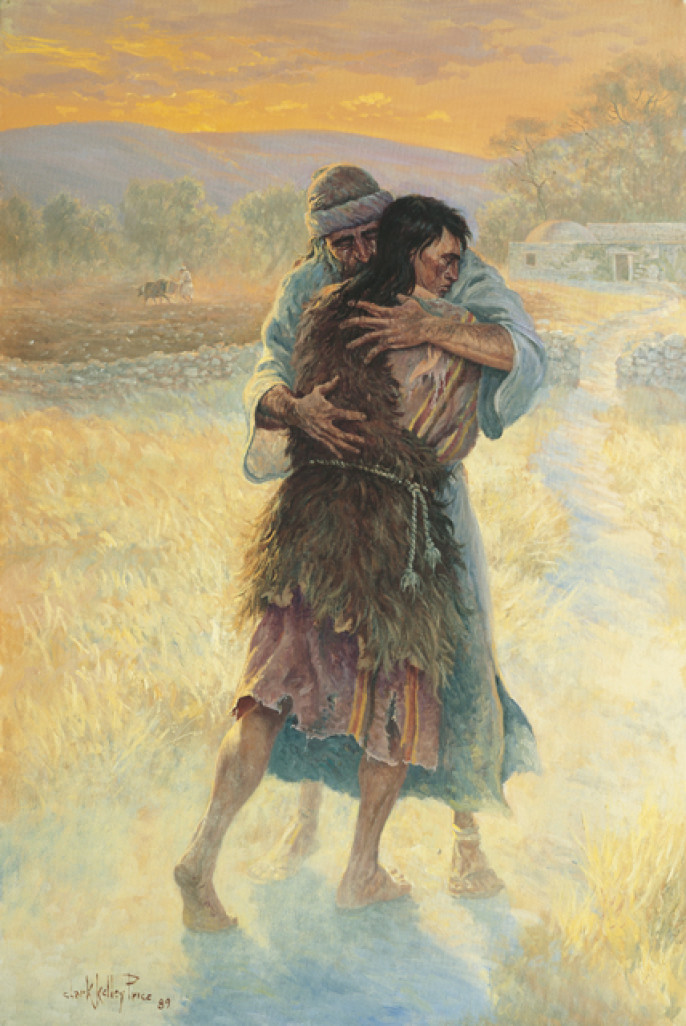The other side of the other side of the prodigal son.

What can we learn from the parable of the Prodigal Son about how we are to act with our brothers and sisters that have gone astray?
The story of the prodigal son is retold time and again in Sacrament meetings around the world as a parable about God's forgiveness. There is, however, another way to look at the parable, rather than skipping to the end, we should look at the beginning and middle.
Firstly, to whom was Jesus speaking when he gave the parable? Verse 1 of Luke 15 explains
1 Then drew near unto him all the publicans and sinners for to hear him.
Near to them, were also the Pharisees, as is pointed out in verse 2, who derided Jesus for associating with sinners. Jesus then gives several parables in rapid succession, explaining to the Pharisees how they should react over a repentant sinner, and outlining their responsibilities. For example, they should "leave the ninety and nine in the wilderness, and go after that which is lost, until he find it". He also explained to them that they should carry the one on their shoulders, rejoicing. In the parable of the woman and the piece of silver, they are told that she (and by extension they) should "light a candle, and sweep the house, and seek diligently until she find it."
These instructions could not be missed by the sinners sitting nearby, and I wonder if any of us in their situation would think something along the lines of, "Yeah, you need to do more to help me, Pharisees!" They were the lost sheep, and the lost coins of Israel, who would come looking for them and bring them in. Then the Master gave the parable of a "certain man who had two sons." This parable is similar to the previous two, but is different is significant ways. In the first parable, the sheep wanders off, most likely distracted, and in the second, the woman lost one of the pieces of silver. In the first, the sheep wasn't necessarily seeking out forbidden paths, it just got lost, and I doubt the silver was looking fro a way to get dropped or lost.
The younger son, however, goes looking for trouble.
11 And he said, A certain man had two sons:
12 And the younger of them said to his father, Father, give me the portion of goods that falleth to me. And he divided unto them his living.
13 And not many days after the younger son gathered all together, and took his journey into a far country, and there wasted his substance with riotous living.
He wanted his half of the inheritance so he could go out partying (riotous living). This was no mistake, or dropped ball, he was looking for a good time. So he goes out and parties, until, in verse 14, he finds himself destitute, out of money, and probably out of friends. On top of having wasted his money, there is a famine in the land, which is so severe that he ends up feeding the pigs, while starving himself:
14 And when he had spent all, there arose a mighty famine in that land; and he began to be in want.
15 And he went and joined himself to a citizen of that country; and he sent him into his fields to feed swine.
16 And he would fain have filled his belly with the husks that the swine did eat: and no man gave unto him.
Now comes the main difference in these stories. In the first two, the Pharisees were told to go get the lost sheep or search out the lost coin, now Christ directs His words to the sinners...
17 And when he came to himself, he said, How many hired servants of my father’s have bread enough and to spare, and I perish with hunger!
18 I will arise and go to my father, and will say unto him, Father, I have sinned against heaven, and before thee,
19 And am no more worthy to be called thy son: make me as one of thy hired servants.
20 And he arose, and came to his father. But when he was yet a great way off, his father saw him, and had compassion, and ran, and fell on his neck, and kissed him.
There are actions in these verses: "He came to himself", "I will arise and go", and "And he arose, and came to his father." Here Christ counsels each of us (for which of us is not a sinner?) that we are also responsible for realizing our fallen and sinful condition, the requirement that we arise and go, and our need to seek out our Father, even, or more especially, when we are in the filthiest of conditions. There is so much focus on the father and the brother, let us not forget the courage of the one who found himself alone and destitute, came to himself, and returned to his father's house. May we all find that same courage, and hear the words of our Father:
32 It was meet that we should make merry, and be glad: for this thy brother was dead, and is alive again; and was lost, and is found.
In the end, we all have a Pharisee and a prodigal son within us, and we are all imperfect, but we can have hope that there are those who are searching for us, and that we can find the strength to find out way back, through the atonement of Jesus Christ, to our Father's house.
Image: The Prodigal Son, by Clark Kelley Price, © 2015 by Intellectual Reserve, Inc. All rights reserved.